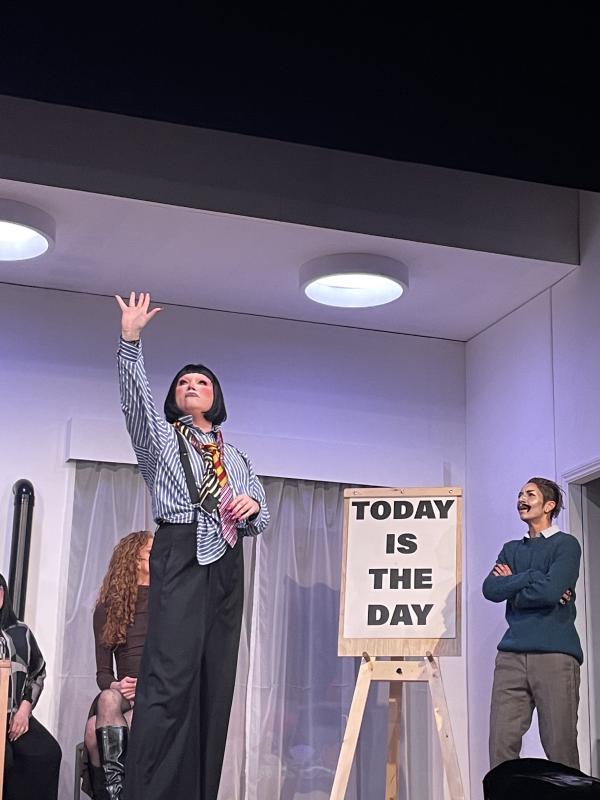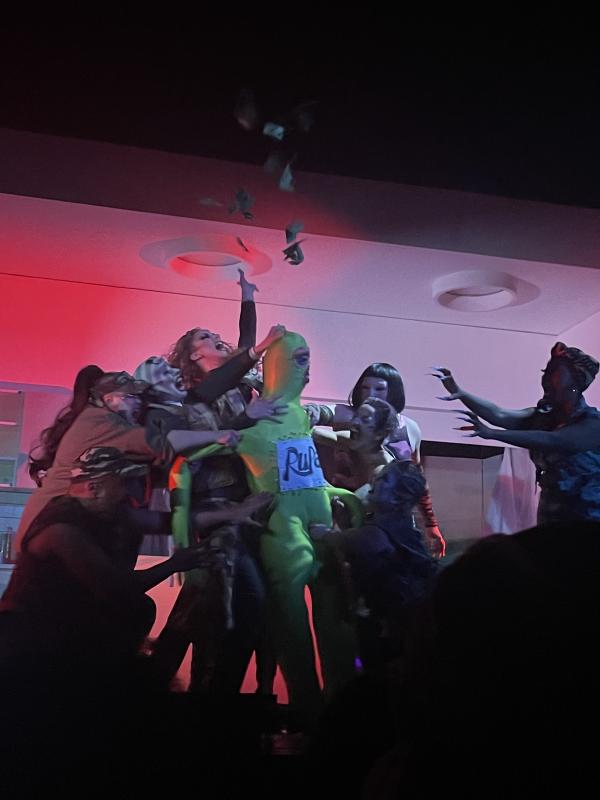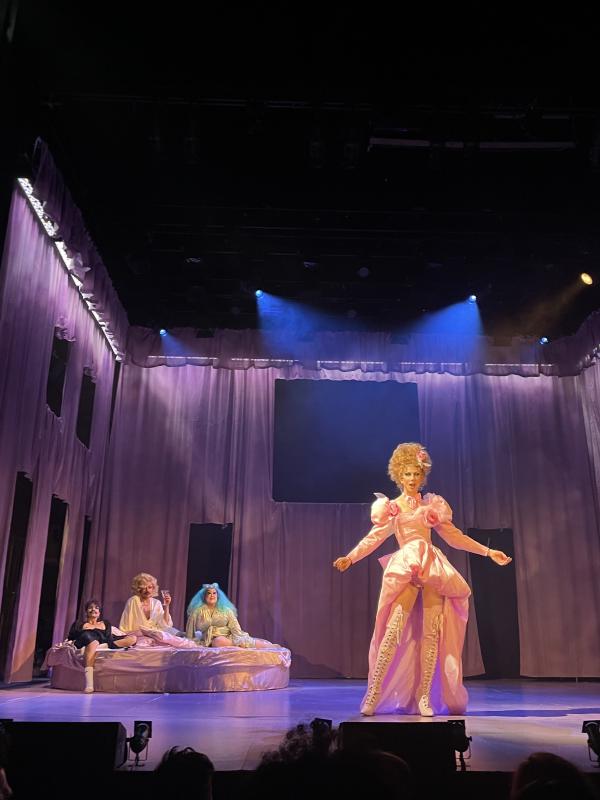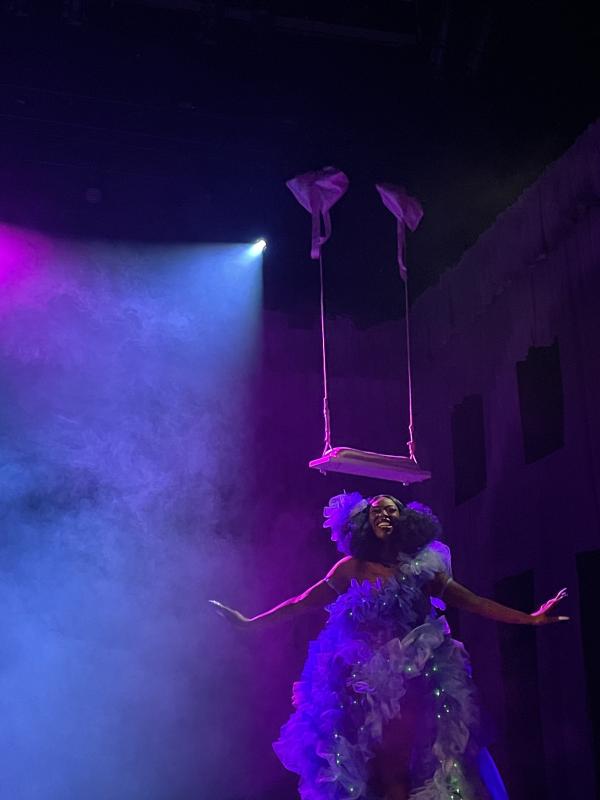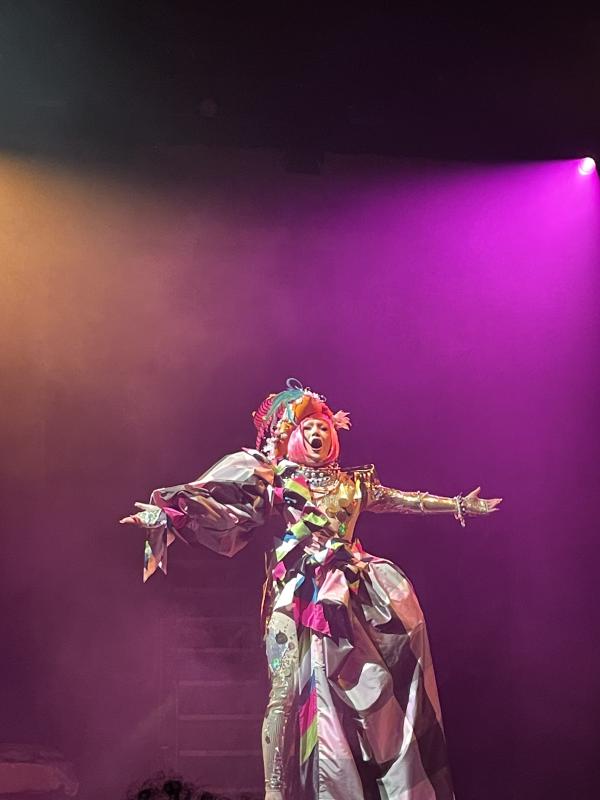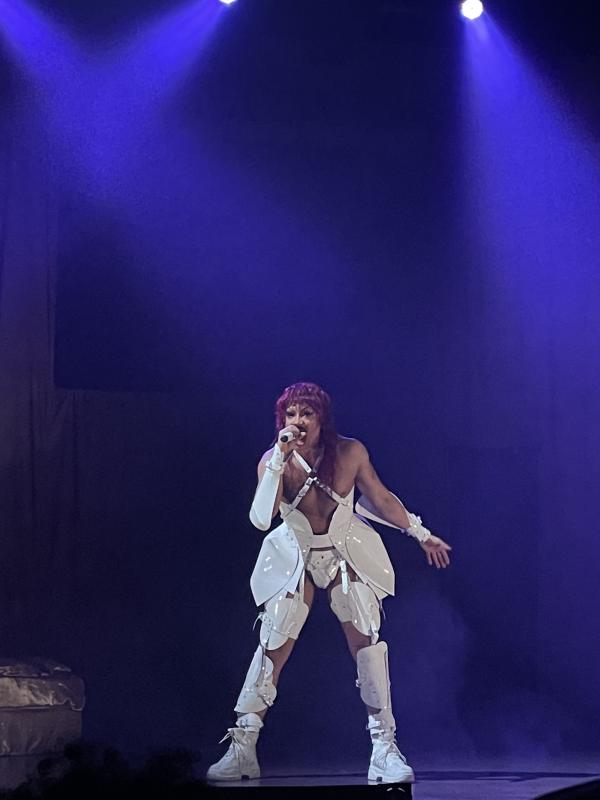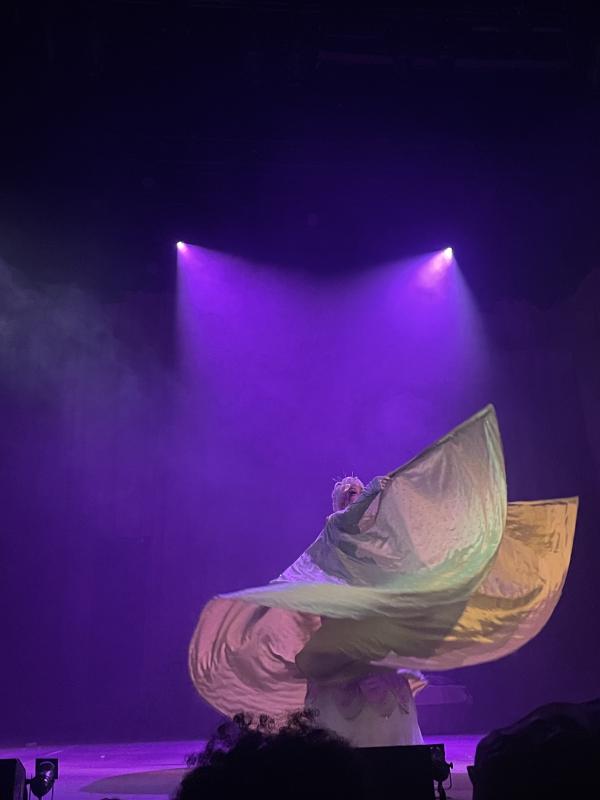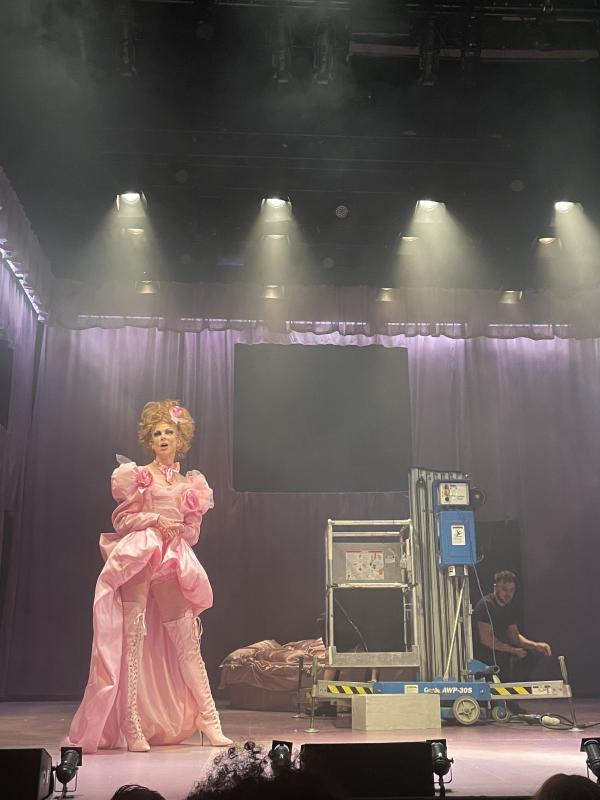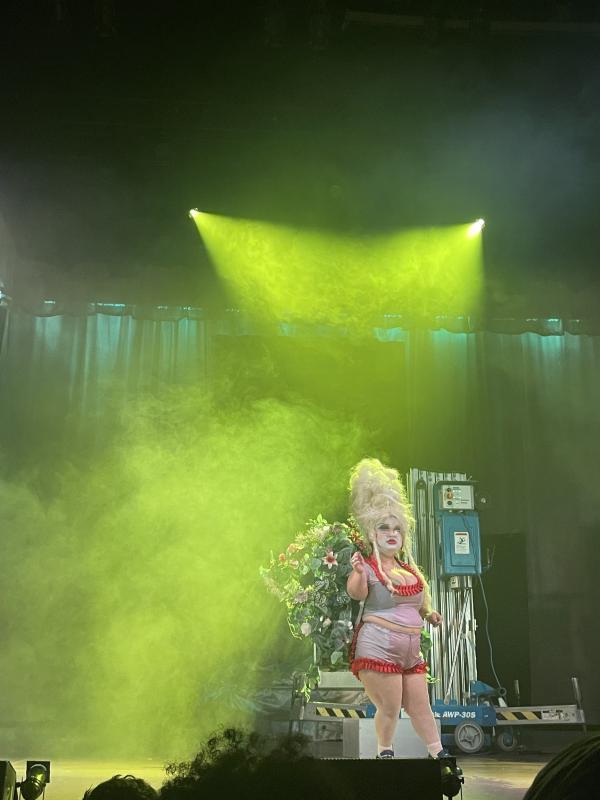Sound of the Underground @ the Royal Court Theatre
ZM
Emoji summary: ❤️🔥❤️🔥❤️🔥
I cannot afford £30 small plates dinner in a place like Sloane Square. So I run to the Royal Court Box Office to pick up my cheeky press tickets (#gifted) and I run to Maccies, and then I run back. I am full of chips and wet from the rain when I finally take my seat.
Sound of the Underground is a play written by Travis Alabanza, it was co-created and directed by Debbie Hannan. The cast is made up of icons from the national queer club scene, they inform and shape the direction of things. Sharon Le Grand, CHIYO, Sadie Sinner, Rhys’s Pieces, Lilly SnatchDragon, Sue Gives A Fuck, Wet Mess, Midgitte Bardot. These are performers who have things: they run their own nights, are part of successful collectives, award-winners, they’re kind of a big deal actually.
The curtain comes up on the first act and I am surprised to see a crisp kitchen. It’s very New Build, open plan, chrome fixtures and smooth surfaces. Rhys storms in on the phone, arguing with an employer on the other end of the line. Sadie slides onstage, the cast members dramatically enter one by one. They keep saying that TODAY IS THE DAY, on a DAY LIKE TODAY. A day like today feels monumentous because… today they are… unionising! At the centre of their collective action is a plan to fix the main issue. They are going in to sort it out, to stop the problem from exploding out and complicating everything else. They are going to kill Ru Paul. Ru Paul killed the art of drag so eye for an eye, justice at last. They stop drop and roll, they rip their smart casual outside clothes off to reveal camouflage fatigues and someone rides out from the wings on a little army style jeep with floodlights attached at the top. Waving hairdryers and big pink dildos, they ride out to an oil rig to locate the target. A green effigy flies out, labelled RU PAUL. We enter bullet time. A strobe light throbs. With beautiful stiletto acrylic nails, they tear into its fabric fleshy body and rip handfuls of money out. The cash goes flying up in the air, tangled in between grasping hands and strands of hair and the effigy’s taut bulbous limbs. The light goes red. The scene flips. Now the cast are cleaning up the stage. They rip tape up from the floor. They sweep the cash into neat piles that get stuffed into binbags. They’re genuinely actually tidying up. It’s a scene change or a scene ending. Either way, the work is the spectacle.
The interval hits and I go out for a cigarette. I speak to someone who says ‘Travis’ work always and without fail remembers material conditions, that’s at the heart of it’. I exhale slowly through my nose, I nod. It’s a concern that never slips out of sight. It’s a central logic. If I’m honest, I am not too sure what material conditions actually are. Like I know what I think it means but I struggle whenever someone asks me to define it. I guess I just don’t have an example of what a material condition is. I’ll list some things I think count as material conditions, you tell me if I’m wrong: everyone’s astronomical gas bills, sky high London rents, inflation, stagnant wages, zero hour contracts. I think it’s about the conditions under which we make a living, the ways we go about making a living, how much living we are actually allowed to live.
The second half is a cabaret. Sue Gives a Fuck acts as host in a billowing pink gown. The cast put on their best show. Wet Mess is wheeled on stage behind an enormous classical painting, the face cut out so they can peek through. They move their body like it is a kind of liquid. Lilly Snatchdragon does some amazing stuff with some fans and it makes me gasp and fling myself back in my seat because it’s not about the fans! Even though control and dexterity is impressive, it’s really about tension and suspense. Sharon le Grand sings a rumbling operatic version of the Cheeky Girls classic Cheeky Song (Touch My Bum) enunciating each word slowly and carefully in a way that feels glamorous, dramatic, sarcastic but also entirely serious. Rhys does a full blown song and dance number with a costume that feels like it’d look more at home on their stadium tour, Sadie Sinner’s burlesque features a full size satin bow-ed swing and a dress with ruffles on ruffles, Midgitte Bardot ascends above on a cherry picker (hose in hand) and sprays the crowd with a yellow piss coloured liquid. They’ve got theatre sized budgets, National Portfolio Organisation sized budgets. Their willingness to play with all that wriggle room is palpable, exciting, it rubs off on me. I want them to show me the money.
The acts take place in a soft satin pink dream space designed by Rosie Elnile and Max Johns. There’s a massive bed in the background and the cast loll across it when Sue delivers her pieces between sets. She talks us through the history of London’s queer nightlife. Legal and not so legal, from the 18th Century’s Molly houses to the Caravan Club. But now - now? Now is a bit funny. A bit sticky. I didn’t know this, but apparently London used to be a destination for LGBTQ tourism. Apparently Derek Jarman moving to Charing Cross made Soho what it is (or was), Covent Garden’s arcades used to be an 18th Century cruising ground, in the 1720s London had more gay pubs and clubs than it did in 1950. Whig history is a mode of understanding human culture as a forward march, constantly progressing towards the glorious and enlightened present. We’ve got it all figured out, haven’t we? Aren’t we so clever? But history slides back. It’s not nostalgic to admit that sometimes some people have it worse than it was before. Now clubs are closing because they’re being turned into luxury flats and it’s so difficult to get a late night licence and the pandemic decimated London’s nightlife so — what do you do when nightlife spaces are your cultural hallway, your stage and studio? Where do you go from there? Not every artist makes things in an airy light-filled studio, or at a neat desk in a trendy East London co-working space. Not every artist makes things that will sit nice and pretty in a half-empty white walled gallery. Nightlife isn’t just fun for the weekends, it isn’t a luxury! It’s a workplace too.
Sound of the Underground is a play about work. It is about labour. The cultural industry is an industry, after all. Artists are workers too (everything that requires work also requires workers). What are the working conditions that culture is actually produced under? Like isn’t it crazy that artists are workers, the literal people that go in and grind against the coalface to produce CULTURE. Yet they’re the ones that get paid the least, the ones that have the most precarious contracts, the ones that have no pension or sick pay. If the cultural industry is indeed an industry, the product would literally not even ever exist without the artist! It’s doubly fucked because exciting new culture, EMERGENT culture is produced at the margins of society. The instability is kind of a key component in innovation - new things don’t get produced at the centre of society, where power resides because power is incapable of production, it seeks ONLY to reproduce (I wrote about this a couple years ago, in a text about Beeple, but I’ll say the line again here: DOMINANT RESIDUAL EMERGENT.)
But who actually owns the means of cultural production!?! And what is the true value of an artist’s labour? What does the shape of the cultural industry mean for artists as workers, like —- are these artist-workers alienated from the object of their labour because of material conditions? Does the shape of the cultural industry individualise people’s working conditions to maximise profit? And WHO is making the profit here exactly? That’s the bit I really don’t understand. That’s the question I really want answered. I have read the work of art in an age of mechanical reproduction. I have read marxism and literature. I have even read that blog about meaningness, MOPS and subcultural cycles that makes sense of the structure that marginal culture is produced against. But I still don’t actually know! Someone must be making mint, I cannot find them. WHO IS THE BOURGEOISIE!??! And is this bourgeoisie in the room with us now?
Culture is increasingly produced by people who can afford to do it as a hobby. Art is not a hobby, obviously. But culture doesn’t slot neatly into capitalism’s value hierarchy, the conservative understanding of culture as something to instrumentalise in service of capital, justifying spending on the arts by making a point about how much the cultural industry contributes to GDP. Art is an end in and of itself! It makes us whole. We are at the margins producing culture at the coalface. Highbrow and lowbrow, the sexual tension between them because I just know that if we weren’t looking on, they’d kiss. The theatre, the ballet, the Royal the National the English National. What art forms do we value and honour with something as special and rare as public funding? When do you get to that point where you can just make things. No friction, no admin, no bullshit. You just get to go to work and make things and things are only as complicated as the work you’re producing. Some people go to an office and make spreadsheets!!!! Why can’t artists go to the studio and make something magical, horrifying, fundamentally aesthetically bankrupt!!!!
The second half ends with CHIYO’s performance. I don’t want to tell you what happens. I think criticism is an interesting medium, a productive medium! Because I tell you all about this thing, this piece of culture that I have experienced and I filter it through myself, I become the conduit. I witness things and then I make a piece of documentation, or I make an account. But CHIYO’s performance and the play ended and I felt silent. Criticism’s discursive mode of production became unnecessary. Sometimes an artist makes something so good that the highest praise you can offer it is your silence. You cannot add anything, you shouldn’t add anything! It is perfect as it is. It doesn’t need me to translate it into text. It was febrile feeling, art, magic, skill at a craft. It was a raw nerve pulled out from beneath the skin, deftly slid from within the body and when it touched open air it made me hurt for it. That’s all.
I’ll tell you what it is. All that stuff in the paragraphs above, that is criticism or discourse or words and thoughts in the form of language. Art operates beyond the boundaries of language. It is not another language or bodily utterance, it exceeds language. It is more than. I can sit here and type up my thoughts and my questions and try and describe and understand what was being pulled in to make this tight fist grip of a work. The fist still flew out to punch me square in the face. The work is the impact or the impact is the point. There’s no point describing the critical value or the cultural importance of the impact because the impact is meant to be felt. I haven’t felt that impact in years! It is so rare!!! I bumble through these galleries and hope to find connection, feeling, romance — I leave high and dry, I go home alone. I howl at the moon in the night sky. I scream: I JUST WANT TO FEEL SOMETHING! ANYTHING! I WANT TO EXPERIENCE REAL LOVE!!!! (With a work of art, you see). I find myself in stiff silent rooms and they are so completely bloodless. They aren’t alive! They are not painful or unpredictable or - they are not anything really. Sound of the Underground was a kind of lament. It was a kind of anger. It was art — the best kind. I think you should probably all see it, if you can.
Into Chiyo’s act. Chiyo, dressed in a Prince-inspired hotpink New Romantic costume, enters to some Mahler and then strips to a grimy club track. Halfway through the strip the track abruptly cuts. Chiyo continues stripping in silence - it is deliberately uncomfortable. He then goes into a speech about work, exploitation and oppression as a Brown trans man written by Travis, which is both rallying and frustrated. It finishes with him removing the final tear-away on his costume which proudly exposes his genitals.
Chiyo It’s all work isn’t it Doesn’t mean I don’t enjoy it But it’s all work isn’t it Or doesn’t mean I don’t enjoy some of it But it’s still work isn’t it.
Knowing that I can make you care about me, By just using my body That’s work Each line of definition Sculpted in my stomach Proving to you that I’m someone you deserve to keep
It’s all work isn’t it
This body was work It takes work I had to grind hard, be grinded down, grind on you To get it. No free shit for me Fundraise by performing Performing to get the money To do the work to the body To mean that I’m safe
It’s all work isn’t it
And then the applause comes And it feels alright When the applause comes Means I must be doing this right Sex sells, And you can’t drawl if you’re too busy thinking So don’t think, just carry on touching.
Because that’s how it’s supposed to work You applause I strip You cheer I strip You question nothing I strip You scream my name We finish
And then you go home. And I go home too,
Chiyo stops stripping now and moves to directly address the audience.
But then on my way home, I get attacked. And I turn to look at someone to help me. Someone that looks like that face I saw in the crowd, and they don’t do shit But they go home and switch on the TV and watch some fucking reality show about our lives, Or enjoy a rainbow flag on their fucking football laces Or use our language Or take our culture Or click at us at the fucking brunch -
But where the fuck is everyone when we actually need you. What the fuck are you doing to keep us actually here?
Chiyo regains composure
It isn’t that this place magically saves us. You can drape us in it all But it doesn’t mean we are in heaven And if you only take from us, Without wondering how to help us keep the lights on, Then we will eventually fall In between the cracks Where maybe the true holy work is done And wait for the next cycle to come…
Sue covers Chiyo back in his clothes. The cast rise from the bed, singing Sound of the Underground as a group. It’s angelic. A calling back to the underground. The set rises back up, They close out the show, The red curtain re-drawn.
